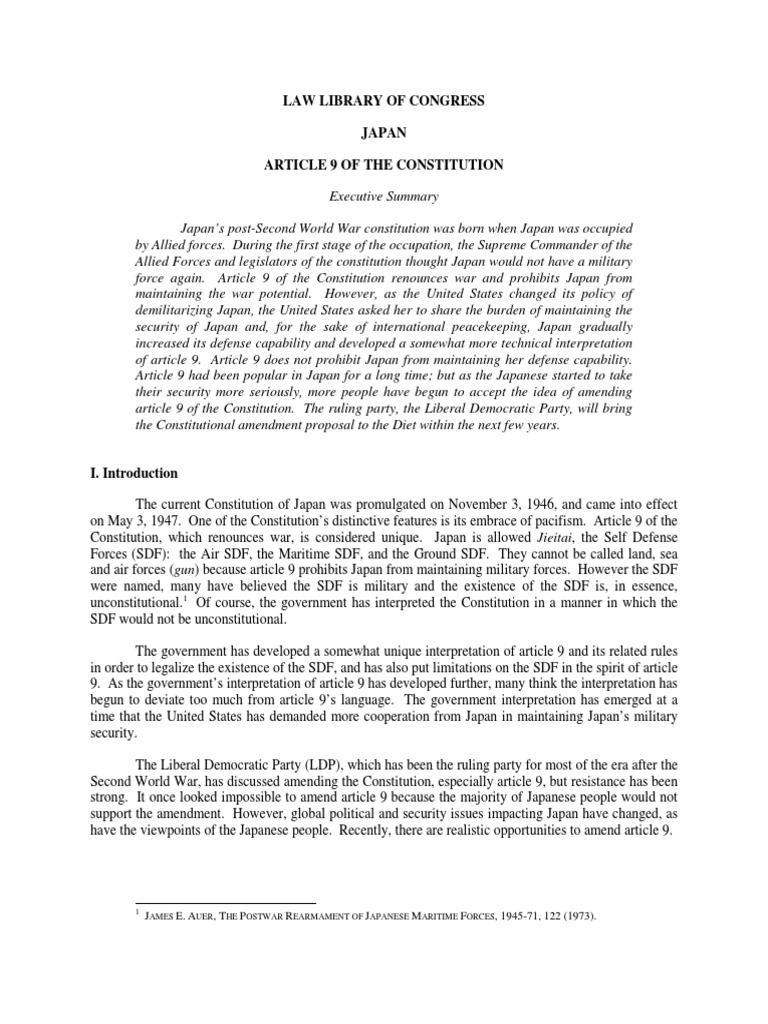Article 9 of the Constitution of Japan is a fascinating exploration of pacifism enshrined within a modern national framework, challenging traditional notions of sovereignty and military engagement. Enacted in the aftermath of World War II, Article 9 stipulates that “the Japanese people forever renounce war as a means of settling international disputes” and prohibits the maintenance of military forces for warfare. This article reflects profound philosophical underpinnings, raising questions and igniting debates not only within a secular context but also through the lens of Christian values. What does this renunciation of war signify for a nation and its ethical obligations on a global stage?
The global context within which Article 9 emerged is significant. Post-war Japan, having witnessed the catastrophic consequences of militarism, sought to redefine its identity. The devastation wrought by the bombings of Hiroshima and Nagasaki created an urgent desire for peace and atonement. This desire resonates with Christian teachings that prioritize peace and reconciliation over conflict and vengeance. Jesus’ Sermon on the Mount exhorts followers to “turn the other cheek,” advocating for a disposition that diverges from the proclivity for violence. Could it be said that Japan’s pacifist stance aligns closely with these spiritual teachings?
However, the interpretation of this article has not been without its controversies. In recent years, the question of Japanese self-defense has surfaced, compelling political leaders and citizens alike to grapple with the implications of strict pacifism in a world fraught with conflict. The emergence of regional threats, particularly from North Korea and the increasing assertiveness of China, has incited discussions about redefining what constitutes defense in a contemporary context. Should a pacifist nation arm itself to contend with existential threats, thus potentially contradicting its fundamental doctrine? This challenge reveals a tension between the ideals of peace and the pragmatic needs for national security.
From a Christian perspective, the concept of self-defense can evoke rich theological debate. Some biblical passages advocate for non-violence, while others present justifiable circumstances for defense. Romans 13:4 articulates that governing authorities are “God’s servants, agents of wrath to bring punishment on the wrongdoer.” This verse indicates that while Christians are called to peace, they must also recognize the role of state authority in protecting its citizens. Should Japan, a nation committed to peace, confront threats with passive inaction, or can it creatively reinterpret its pacifist ideals to incorporate aspects of self-defense?
The philosophy underlying Article 9 also opens the discourse on humanitarian intervention, a subject that finds resonance with Christian ethics. Can a nation that advocates peace stand by while egregious human rights violations occur elsewhere? This question is particularly poignant in the face of global crises where intervention might be deemed necessary to prevent atrocities. Christians are reminded of Jesus’ charge to care for the marginalized and oppressed. Therein lies the conundrum—how does one reconcile a commitment to peace with the very real necessity of intervening to protect the innocent? Would Japan be justified in breaking its vow of pacifism in such circumstances?
The ideational battleground surrounding Article 9 inspires complex discussions about national identity and morality. Many proponents of the article argue that Japan’s devotion to peace positions it as a moral leader in an increasingly chaotic world. This aligns intriguingly with the notion of a ‘Christian nation’—a concept often debated within theological circles. What is a nation, if not defined by the principles it upholds? Does embracing pacifism not also provide it a unique ethical stance, akin to a Christian’s commitment to love and peace?
On the other hand, critics of Article 9 argue that an unwavering refusal to engage militarily compromises Japan’s role and responsibility in international affairs. Surely, a balance must be struck somewhere between the ideals of pacifism and the necessity of justice? Furthermore, they assert that to remain entirely passive may lead to moral culpability. Is inaction an acceptable response when faced with injustice? The challenging interplay of war, peace, and morality prompts a necessary examination of both Japan’s constitutional decree and the divergent approaches within Christian theology.
The future of Article 9 appears uncertain as Japan navigates the complex geopolitical landscape. The ongoing discussion over military rearmament implicates not only national policy but the moral backbone of the nation itself. Is it possible for Japan to adapt its definition of peace while remaining true to its foundational principles? Thus, Japan stands at a crossroads, where the pursuit of peace must be continually reconciled with the realities of a perilous world. A challenge lies before its citizens— to embrace a holistic understanding of pacifism that accounts for their duty to protect not only their nation but also the fragile tapestry of global humanity.
In the quest for peace, nations often grapple with their moral imperatives. Article 9 of the Japanese Constitution serves as a poignant case study. Should countries cling steadfastly to ideals of pacifism, or is there room for strategic adaptations? Ultimately, the confluence of ethics, national identity, and global responsibilities beckons a thorough inquiry into the very nature of peace itself. In viewing these themes through a Christian lens, we are reminded of the profound complexities of love, justice, and the human experience in a fractured world.



